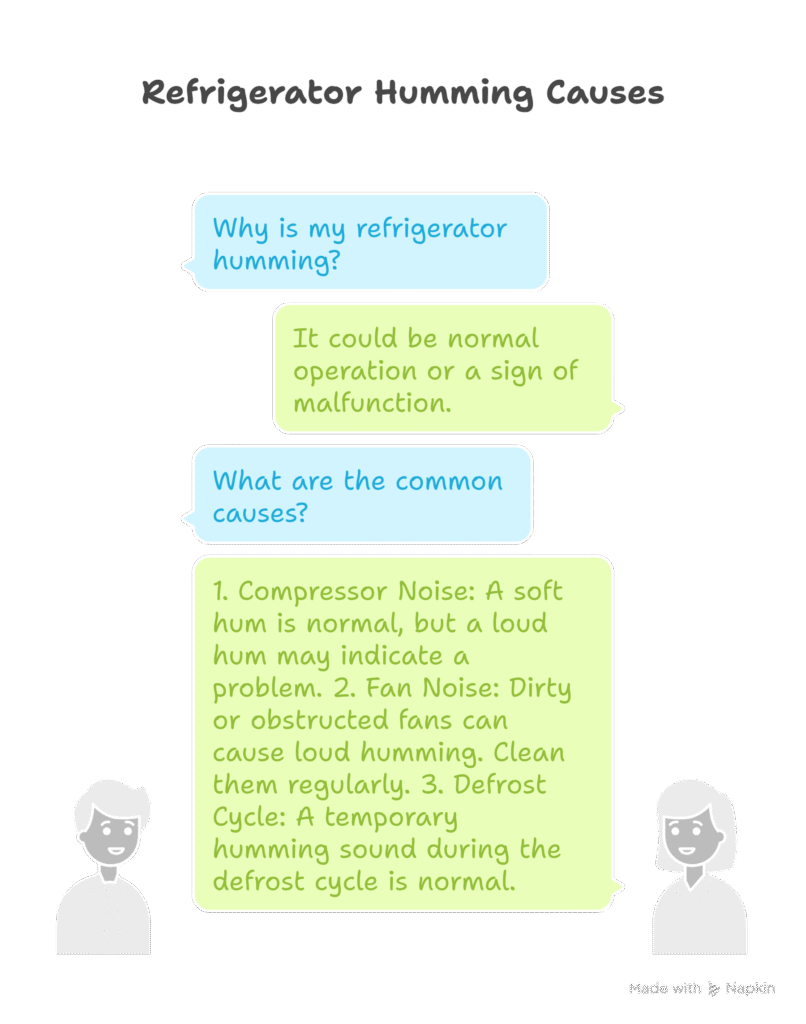Understanding Refrigerator Humming Noises
Have you ever walked into your kitchen only to hear a constant refrigerator humming sound? While some level of fridge noise is normal, an unusually loud or persistent hum can be worrying. A humming refrigerator may indicate issues with the compressor, fan, or defrost cycle. By understanding the common causes of refrigerator noises and applying simple troubleshooting tips, you can keep your fridge running efficiently and quietly.
Identifying the Source of Humming Sounds
Pinpointing why your fridge is humming can be challenging if you’re not familiar with how refrigerators work. However, identifying whether it’s a normal sound or a problem can help you avoid expensive repairs. Recognizing the source early allows you to extend the lifespan of your fridge and reduce unnecessary stress on its components.
Common Causes of Refrigerator Humming
A refrigerator humming noise can either be normal operation or a sign of malfunction. Below are the most common reasons behind fridge humming sounds:
1. Compressor Noise
The compressor is the heart of your refrigerator’s cooling system. A soft, steady hum from the compressor is expected as it cycles on and off. However, if the noise becomes louder than usual, it may be a warning sign.
2. Fan Noise
The fans inside your fridge circulate cold air. If dirty or obstructed, they may create a loud humming or buzzing noise. Cleaning the fans regularly reduces this problem.
3. Defrost Cycle
During the defrost cycle, the heater melts ice build-up, often producing a temporary humming sound. This is normal and usually stops once the cycle ends.

Troubleshooting a Humming Refrigerator
If your fridge humming noise seems abnormal, here are steps to fix it:
- Inspect the Fan – Clean the fan and ensure it spins freely.
- Check the Compressor – Allow proper ventilation space behind the fridge.
- Level the Refrigerator – An unlevel fridge can vibrate, creating a loud hum.
- Inspect Door Seals – Worn-out seals make the compressor work harder, increasing noise.
- Check the Drip Pan – Ensure the drip pan is secure; a loose one may vibrate and hum.
When to Call a Professional
If the humming refrigerator noise continues despite troubleshooting, it may require expert repair. Call a technician if you notice:
- Persistent loud humming despite cleaning and leveling
- Burning smells or refrigerant leaks
- Temperature fluctuations in the fridge or freezer
Preventive Maintenance Tips
Prevent a noisy refrigerator with these regular maintenance practices:
- Clean condenser coils every six months
- Defrost manually if your fridge doesn’t have auto-defrost
- Keep correct temperature settings to reduce compressor strain
- Inspect and clean door seals regularly
Refrigerator Brands and Noise Levels
Different brands vary in how much humming noise they produce:
- GE Refrigerators – High-efficiency compressors may hum louder.
- Whirlpool Refrigerators – Fan or compressor obstructions often cause humming.
- Samsung Refrigerators – Usually quiet, but improper leveling can cause noise.
Conclusion
A refrigerator humming noise is often normal but can sometimes signal an issue. By following the troubleshooting steps and preventive maintenance tips above, you can ensure your fridge runs quietly and efficiently. If the noise is persistent or accompanied by other warning signs, it’s best to call a professional.
FAQs about Refrigerator Humming
1. Why is my refrigerator humming loudly?
A loud refrigerator humming noise often comes from the compressor, fan motor, or an unlevel fridge. Cleaning and proper leveling usually reduce the sound.
2. Is refrigerator humming normal?
Yes, mild refrigerator humming is normal since the compressor and fans work to keep food cold. Only unusually loud or persistent humming should concern you.
3. How do I stop my fridge from humming?
You can stop refrigerator humming by cleaning the condenser coils, inspecting the fan, checking the drip pan, and ensuring the fridge is level.
4. Why does my fridge make a buzzing or humming noise?
A fridge humming or buzzing sound may indicate a dirty fan, clogged coils, or a defrost cycle in progress.
5. Can refrigerator humming mean a problem?
Yes. If the humming sound is louder than usual or accompanied by temperature changes, smells, or leaks, it could signal a compressor or motor issue.
6. How can I reduce refrigerator vibration noise?
Place the fridge on a level surface, secure the drip pan, and add padding under the legs if needed to minimize vibration-related humming.
7. Why is my new refrigerator humming?
New refrigerators often hum due to high-efficiency compressors and fans. The sound is usually normal unless it becomes excessively loud.
8. Does refrigerator humming affect performance?
A mild hum does not affect performance. However, loud humming may mean the fridge is overworking, which can impact cooling efficiency.
9. Should I worry about my fridge humming at night?
A soft refrigerator humming noise at night is normal. But if it’s very loud, check for issues like loose fans, an unlevel fridge, or a failing compressor.
10. When should I call a professional for refrigerator humming noise?
If troubleshooting doesn’t fix the hum, or if you notice burning smells, leaks, or fluctuating temperatures, call a technician immediately.





